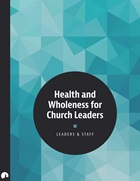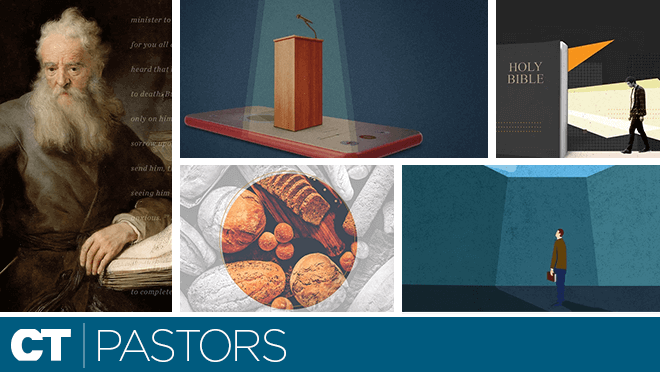
The lack of correlation between time at work and quality of work has been a recurring theme in Harvard Business Review over the last decade. Not long ago, I received an email newsletter with yet more research showing that working more hours does not mean working more effectively. The article cited a study where managers could not tell the difference in work output between employees who worked 80 hours a week and those who only pretended to work 80 hours a week.
The article summarized its findings with this statement: “Keep overworking, and you'll progressively work more stupidly on tasks that are increasingly meaningless.”
We followers of The-God-Who-Rested are happy to find confirmation outside the church that rest is best. After all, we worship the One who modeled a rhythm of rest: God created the heavens and the earth, plants, sun, moon, stars, human beings—all of life—in six days. And on the seventh day he didn’t create anything. He rested.
Not only does a Sabbath day of rest follow God’s example; it also follows his command in Exodus 20:8–10: “Remember the Sabbath day by keeping it holy. Six days you shall labor and do all your work, but the seventh day is a sabbath to the Lord your God. On it you shall not do any work.”
Jesus reiterates the call to Sabbath-keeping when he says to his disciples, “Come with me by yourselves to a quiet place and get some rest” (Mark 6:31). The Gospels offer multiple examples of Jesus himself going away to a solitary place to pray. (Just to pray!) If Jesus needed rest, surely we need it.
If quality time in the presence of God is hard to come by during the workweek, it is good to know there is a dedicated day to resting and re-focusing on God. When taking a Sabbath, I more easily remember that apart from Jesus I can do nothing. A Sabbath way of life acknowledges that God is God and I am not. We pastors remember that the church will go on without us, and we gain much-needed perspective for more creatively addressing the challenges of ministry.
Psalm 127:1–2 says:
Unless the Lord builds the house,
its builders labor in vain.
Unless the Lord watches over the city,
the watchmen stand guard in vain.
In vain you rise early
and stay up late,
toiling for food to eat—
for he grants sleep to those he loves.
I can’t think of any ministers who read these verses and take them as license to let go (of all responsibility) and let God. We pastors have the opposite danger: hammer and nails in hand, we forget that God is architect, carpenter, and general contractor.
Lead your congregation (and yourself) into Sabbath rest.
If Sabbath is a gift, part of the abundant life Jesus promised, why don’t we observe more Sabbath days?
One possible lens through which we might understand this question is a diagnostic grid put together by a couple of Harvard educators, Robert Kegan and Lisa Laskow Lahey. It helps us unearth our subtle, competing values that keep us from doing what we think we should and what we want to do.
Kegan and Lahey have us begin with a commitment or value or belief—something we say is really great if it happens. In this case, to adapt their language, “We are committed to the value or importance of … Sabbath-keeping,” both as a distinct day and as a mentality throughout the week.
Then we ask, “What are we doing or not doing that prevents this from happening?” Pastors could invite their congregation to ask, What am I doing or not doing that prevents Sabbath-keeping and rest? Of course there are external factors, but here the focus is on what I am doing (or not doing) that prevents Sabbath rhythms in my life.
Underneath the answer to that question, Kegan and Lahey point out, is a competing commitment or value or belief. Based on what I’m doing to undermine my Sabbath-keeping—checking work email on a day off, not delegating or asking for help, committing to more than six days of work a week—“I may also be committed to” values like getting everything done myself to make sure it gets done right. Or, “I may also be committed to” going on because I have to.
After helping participants unearth a competing value, Kegan and Lahey suggest that each competing value carries with it a “big assumption” that may or may not be true. For example, If I don’t do this task, it will never get done, and there is no one else in the entire universe who can do it as well as I would. Or, I’m also committed to working seven days a week (competing value), because (here’s the big assumption) if I stop and take a Sabbath, I’ll be so stressed out catching up on the day after, it won’t have been worth it.
Walter Brueggemann talks about these tempting assumptions as having a scarcity mentality. He says:
There’s never enough time; there’s never a moment’s rest. … But how willing are we to practice Sabbath? A Sabbath spent catching up on chores we were too busy to do during the week is hardly a testimony to abundance. [It] does nothing to weaken the domain of scarcity. Honoring the Sabbath is a form of witness. It tells the world that “there is enough.”
We have a host of competing values, commitments, and assumptions that keep us from fully practicing God’s call to a Sabbath rest. We pastors would benefit from working through Kegan and Lahey’s diagnostic grid ourselves to see the real reason(s) we don’t take a Sabbath. (Find a downloadable version here.) Then we could lead our congregations in the same exercise. It’s one part confession, one part spiritual reorientation, and one part action planning for more faithful Sabbath-keeping.
I’ve found the exercise as helpful as it is convicting. Thinking about those weeks I skip a Sabbath has unearthed competing values I didn’t realize I had. Here are a few internal commitments that keep me from faithfully practicing my value of Sabbath-keeping:
- I value making sure the work is done, and done by me, because I don’t want to prevail upon others.
- I am committed to squeezing side projects into the margins so I can do more than what is in my job description. (Sabbath becomes one of those “margins” I invade.)
- I am committed to self-protection by avoiding the work of interior reflection that is part of good Sabbath-taking.
- I value doing what I want when I want, including working on a planned day of rest if it is expedient.
The last step in Kegan and Lahey’s diagnostic tool is to try “a modest, safe test.” Once when I was in a margin-less season, I decided to take a full Sabbath day each week for the next four weeks. Then I evaluated the experiment. I asked questions like, How did it go? Did my anxiety levels rise or fall? How did the four weeks of Sabbath affect my relationship with God? Did I find the scarcity I feared, or did I receive good gifts from the God who gives rest to the ones he loves? For the record, during my experiment I tasted and saw that the Sabbath and the Lord of the Sabbath were good.
Start small. See how unfounded your big assumptions about Sabbath are.
Make Sabbath-keeping a lifestyle.
How can the Sabbath—both as a day and as a way of life—make its way onto your calendar?
A Sabbath Hour
Think small, to begin with: one hour. God didn’t say, “Remember a Sabbath hour and keep it holy,” but observing a Sabbath hour is in line with his intention for God-centered rest. Especially with 12-hour days of meetings, sermon prep, and leadership development, an hour of deliberate rest goes a long way.
I don’t remember how I first got the idea of a Sabbath hour, but even when I’m observing my Tuesday Sabbath regularly, I can lose sight of God in the pressure of the day. I need a built-in space that comes around more than once a week, dedicated for rest and reconnection. On these Sabbath-hour days, I feel fresher, gain better insight into ministry needs, experience gratitude for my relationship with God, and enjoy life more. Conversely, when Sabbath is not integrated into every day, I get impatient faster, experience more angst, and say, “I’ll pray for you,” without following through. I’m also more likely to attribute any success to my own efforts.
A Sabbath Day
Which day you take a Sabbath is less important than committing to one every week. For most working ministers, Sunday is not a candidate, but a weekday is. If “DAY OFF” or “SABBATH” doesn’t go into my calendar as a day-long appointment, I’m likely to fill that day with other non-restful commitments. This is especially true in my busiest seasons, when I most need a guarded day.
A Sabbath Getaway
Once you’ve established a regular Sabbath day, go even deeper by adding a day or half-day retreat every month. A Sabbath getaway is not just taking a day off. It’s physically going somewhere else—to the beach, for a hike, or for an overnight camping trip.
Techno Sabbath
One of my church’s parishioners shared with me his way of practicing a holy, God-focused Sabbath: a techno Sabbath. He didn’t mean a day devoted to electronic dance music (though it’s an intriguing idea), but a Sabbath from technology.
Sure, we can turn our devices off for short periods of time—an hour, for the morning, during dinner, and after. But I’ve found a full 24-hour break from technology each week is both embarrassingly difficult and surprisingly life-giving. Rather than reaching for a device that has a potentially life-changing notification on it, I try to offer those longings to God.
I’ve felt especially free when observing a techno Sabbath on my weekly Sabbath day. The price of that freedom was pushing past the unpleasant realization that I’m overly dependent on electronic devices, not just for productivity and connection, but also for distraction, escape, and avoiding reflection. Richard Foster in Celebration of Discipline asks, “How do you discern an addiction? Very simply, you watch for undisciplined compulsions.” I might never have discerned my undisciplined compulsion to “just check” my phone every five minutes without a day of fasting from tech.
Each week follows a similar pattern: the first hour after I get home from church, my techno Sabbath begins, but all I want to do is zone out on my iPad. The second hour is a little easier: I spend time with my family or read a book. By evening I’m actually glad for the break from technology. The next morning I’m so rejuvenated from unplugging, I don’t want to check my email ever again. This is a much healthier mindset for when I open my mail app on Monday afternoon. I don’t feel its pull as much. I don’t have to check it.
As we more deliberately practice Sabbath-keeping, may we find Isaiah’s prayer fulfilled: “O God, you will keep in perfect peace those whose minds are fixed on you; for in returning and rest we shall be saved; in quietness and trust shall be our strength.”
Abram Kielsmeier-Jones is pastor of Union Congregational Church in Magnolia, Massachusetts.

Support Our Work
Subscribe to CT for less than $4.25/month
























